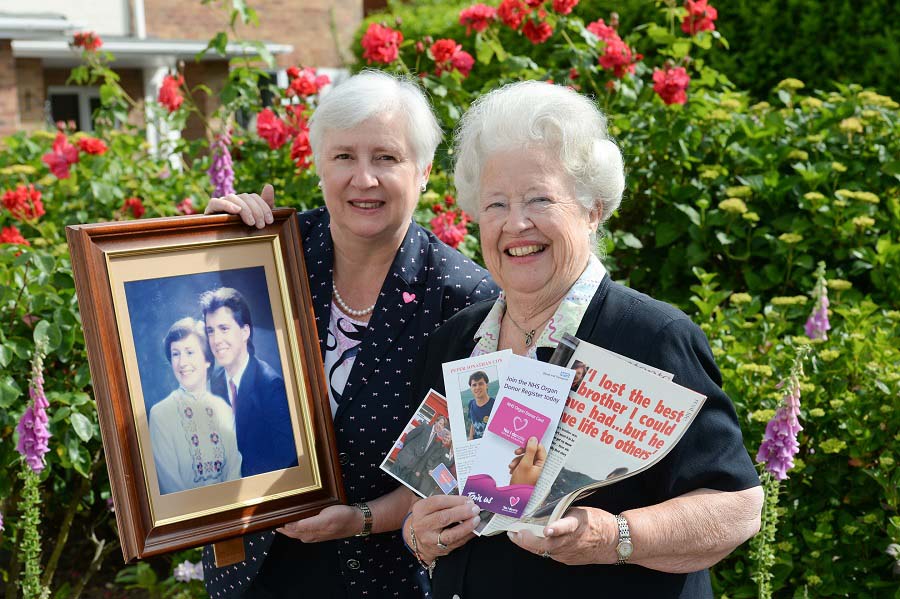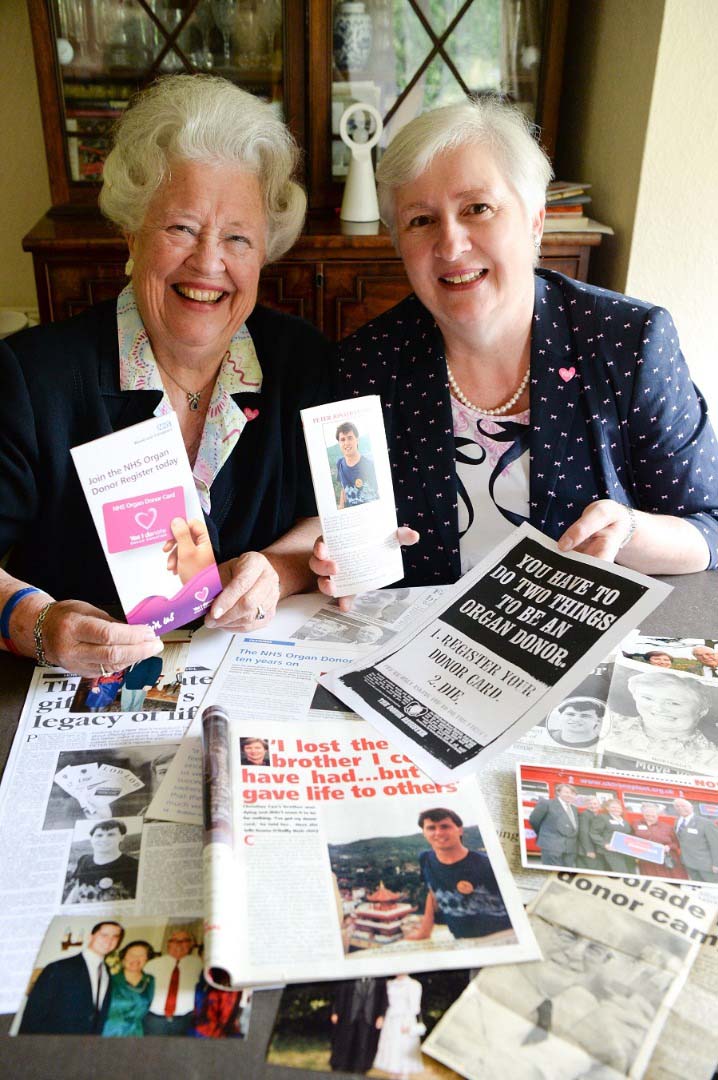Family’s campaign to create organ donor register
NHS Blood and Transplant has thanked the Cox family for their campaign to create the NHS Organ Donor Register as the country gets set to celebrate the 70th anniversary of the NHS.
New figures checked for the NHS70 celebrations show that 6,600 people who were on the register have now become donors after their deaths since it was launched in 1994, leading to 18,000 life saving and life improving transplants. (1)(2)
 The Cox family (pictured: Christine Cox left and Rosemary Cox), from Wolverhampton, led the public campaign for the register in memory of Peter Cox, who died of a brain tumour in 1989 aged 24 and became a donor.
The Cox family (pictured: Christine Cox left and Rosemary Cox), from Wolverhampton, led the public campaign for the register in memory of Peter Cox, who died of a brain tumour in 1989 aged 24 and became a donor.
They discovered there was no UK-wide central register of people who wanted to donate. They wanted to help stop other families suffering the grief of losing a loved one.
Today, there are now more than 25 million on the NHS Organ Donor Register, representing 38% of the UK population.
The centralised donor register allows Specialist Nurses in Organ Donation to quickly and easily check if someone has indicated they wish to donate. More than nine out of ten families now agree to support donation if they know their relative was on the register. (3)(4)
The role the Cox family played has been brought into the spotlight for the NHS 70 anniversary on July 5, and with the Government’s plans for an opt out system of organ donation legislation. (5)
John and Rosemary Cox, together with their daughter Christine, decided they wanted to make something positive come out of the tragic loss of their dearly loved son and brother, Peter.
Peter Cox, a graduate civil engineer who was working on the M40, died after a nine-month illness due to an astrocytoma.
“When he knew he was dying, he told us that he wanted to donate his organs and it was up to us to make it happen,” said Christine, 55, who, until recently, worked for Rolls-Royce plc as Executive Assistant to the Chief Executive.
“He was the most inspirational young man I have ever known. I miss him every day. He loved his family, he was very charitable. He was the life and soul of the party. He would have made a difference to the world. He is still an inspiration and he is still giving so much to so many people.”
Following Peter’s death, the family wrote to Virginia Bottomley, the Secretary of State for Health at that time, with their vision for the first step in bringing a presumed consent (or ‘Opt out’) system into being - a UK-wide database of people willing to give their organs. The family were told an opt out system would not reach legislation at that time and they put their efforts into establishing the database.
Kidney donor cards had been around since 1971 and these were replaced by donor cards for most organs in 1981. However, donor cards could be lost, or simply not found by busy medical and emergency services staff. The wishes of some people who wanted to donate went unknown.
The family wrote hundreds of letters and give interviews to national newspapers and broadcasters. They worked with MPs and Peter's story was discussed in parliament.
In 1993, Christine spoke at the Conservative Party Conference in Blackpool and following meetings with Minister Tom Sackville in 1994, Tom announced the formation of the NHS Organ Donor Register in October 1994. The family worked on the national publicity campaign that followed and the register has become an integral part of the work of NHS Blood and Transplant.
The family have been interviewed for documentaries and features to mark the NHS70 celebrations. Christine said it was ‘amazing, incredible’ to hear that 18,000 transplants had taken place from people on the NHS Organ Donor Register.
Today, the ODR is managed by a team of 10 based in Bristol. The main source of registrations is the DLVA website and the second highest source of registrations is through www.organdonation.nhs.uk. More than 1 million people now join the register each year.
 The family continued to campaign after 1994 for an opt out system. John Cox, a retired civil engineer, died in 2007. Christine, 55, who lives in central London, and her mum Rosemary, who lives in Wolverhampton, are still campaigning.
The family continued to campaign after 1994 for an opt out system. John Cox, a retired civil engineer, died in 2007. Christine, 55, who lives in central London, and her mum Rosemary, who lives in Wolverhampton, are still campaigning.
Ben Hume, NHS Blood and Transplant’s Head of Transplant Support Services, which includes the NHS Organ Donor Register, said: “We’re so grateful to the Cox family for their tireless work. The NHS70 celebrations are not just about recognising NHS staff but members of the public who have worked to save lives.
“Nine out of ten families agree to support donation if their relative is on the NHS Organ Donor Register. The register provides clarity and enables more lifesaving transplants.
“If a family knows that their relative wanted to save lives and was on the Register it can be so much easier for them to support this. If their relative had not registered, the family is still approached about donation and asked to make a decision at a very difficult time on their relative’s behalf.
“So, we urge people who support the lifesaving power of organ donation to join the NHS Organ Donor Register and tell their families they want to donate.”
Christine added: “We wanted something positive to come out of Peter’s death. We wanted to stop other people going through what we want through when we lost Peter. We want to give a voice to the thousands of people on the transplant waiting list who are too weak to fight for themselves.
"We have achieved many ambitions in our lives but the NHS Organ Donor Register is the most important as it not only saves lives but improves the quality of life for the recipients and their families as well.”
- Tell your family you want to donate and then join the NHS Organ Donor Register at www.organdonation.nhs.uk
Ends
For additional information please contact Stephen Bailey in the NHSBT Press Office on 0151 268 7017 or on Stephen.bailey@nhsbt.nhs.uk or the NHS Press Office on 01923 367 600 or email pressoffice@nhsbt.nhs.uk.
Press Release Notes
- NHS Blood and Transplant statistics show that as of May 14 2018, there have been 6,613 deceased organ donors who were on the NHS Organ Donor Register, and that these donors enabled 18,026 transplants. This is since the register was launched on October 6, 1994.
- Kidney Wales was instrumental in setting up Lifeline Wales in 1986, which was an electronic donor register for Wales. Donors on this database were transferred to the UK-wide NHS Organ Donor Register after it was created in 1994.
- The Kidney Research Unit Foundation played a major role in getting an organ donor card attached to new driving licences, and was instrumental in setting up Lifeline Wales, a database of people willing to be organ donors in the event of their death. This pioneering scheme was launched in 1986 by the late Princess of Wales and was part-funded by the charity.
- NHS Blood and Transplant statistics show that 90.5% of families supported donation during 2016/2017 if their loved one was on the NHS Organ Donor Register. Only 46.7% of families support donation if their relative is not on the ODR and there is no other indication of their wishes. The register is checked only when someone has been declared dead or when the family has agreed further treatment is futile.
- If someone dies in circumstances where they can donate, and they are on the NHS Organ Donor Register, the family can be still asked if they will support donation. Donation does not go ahead without family support. Only around 1% of people die in the medical circumstances where donation and transplantation is possible.
- The Department of Health and Social Care has carried out a consultation into an opt out organ donation system for England and the results will be published later this year. Separately, a private members bill has passed a second reading in parliament. Under the proposed system, you would be a donor unless you made it clear you didn’t want to donate. Wales has had a deemed consent (‘opt out’) organ donation system since December 2015. The Scottish parliament has published plans for opt out legislation following a consultation. Northern Ireland has confirmed that it will not be changing to an opt out system.
NHS Blood and Transplant notes to editors
- NHS Blood and Transplant (NHSBT) is a joint England and Wales Special Health Authority. Its remit includes the provision of a reliable, efficient supply of blood and associated services to the NHS in England. It is also the organ donor organisation for the whole of the UK and is responsible for matching and allocating donated organs.
- Around 25 million people in the UK have already signed onto the NHS Organ Donor Register. These people have joined the Register to record their decision to donate organs and/or tissue after their death for transplantation. This information is used by authorised medical staff to establish whether a person wanted to donate.
- It is quick and easy to join the NHS Organ Donor Register. Visit www.organdonation.nhs.uk or contact our 24 hour a day donor line - 0300 123 23 23.
#OrganDonation
Use the hashtag. Share your decision.
